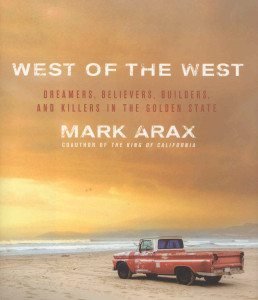WATERTOWN, Mass. (A.W.) — Not to cast a shadow on “This American Life’s” Ira Glass, but when it comes to native Californian expose and nonfiction writing, no one else can hold a candle in the wind to the supreme coolness of former L.A. Times senior writer Mark Arax and his newest pseudo memoir/investigative road trip West of the West: Dreamers, Believers, Builders, and Killers in the Golden State (Public Affairs Books, April 13, 2009).
In the vein of a post-modern Travels with Charlie meets “Route 66” meets “Frontline,” Arax takes us as educated readers through a consumer neo-noir underbelly of California culture as he drives to every corner of the state digging up old contacts and investigating new journalistic avenues.

With each chapter, Arax tells the story and expose of a different portion of California’s ethnic and social mosaic land of slanged “fruits and nuts,” and those of a great many arduously suffering and off the radar hardworking subcultures in between.
From the tale of multi-million dollar real-estate fraud and carpet bagging in “The Last Valley,” to the wrenching demise and fall of Berkeley as a center of the nation’s political dissent due to football stadiums, Gitmo torture planners, and Asian student influxes in “Eyre of the Storm,” to the incredible report in “The Agent” of the F.B.I. waging a no-holds-barred legal battle against its most decorated retired agent over post September 11 terrorism polices, Arax finds the strands of truth and grit that both make and unravel California dreams and American nightmares.
He does so not with ingratiating characters, but with the stories of real-life people who lead lives stranger than fiction with generosities and vices we as readers can understand, but whose tales could only exist in a land as fruitful and surreal as California.
As tends to be written in uncertain and troubling socio-political times, West of the West is not a happy book; rather, it is a needed book, an important book, a book as beautifully written and deeply colored as an Armenian carpet, and a book that will get even seasoned cynics to raise an eyebrow and mutter under their breath, “Damn this is good.”
In Arax’s chapter “The Great Microbe Hunt,” which tells the story of the government’s crusade against the consumption of organic or raw milk on the pretense of an E. coli outbreak despite its proven health benefits, he chronicles of modern supermarket milk methods: “Raw milk, McAfee said, was never a problem until humans chose to huddle in the big city. New York and Boston, not the dairy farm, had given milk a bad name. In the mid-1800s, the manufacturers of whiskey sought an easy place to dump their slop. Next to their downtown mills, they built barns with enough cows to consume vast amounts of used-up mash. Distillery slop made for awful milk, thin and blue and they threw in all sorts of junk to make it thicker and whiter. Through the 1890s, more than a quarter of the babies in New York City died each year before their first birthday due to tainted milk.”
Arax conversely reports in the same chapter from milk scientist Alex Avery: “Cows that graze exclusively on fresh grass produce a milk that contains nearly double the beta carotene, omega fatty acids and vitamin content of regular milk.”
West of the West is full of such mini-revelations on issues as diverse as organized crime, realty fraud, the tragically cautionary Armenian tale of the rise and homicidal fall of the Zankou Chicken empire, the million-dollar marijuana market of Mendocino and Humboldt’s Emerald Triangle, and others.
If you can’t afford to “Go West, young man” in Manifest Destiny to California this summer, manifesting $26.95 to pickup West of the West is the next best intellectual investment, and it comes with less beach erosion.


Be the first to comment